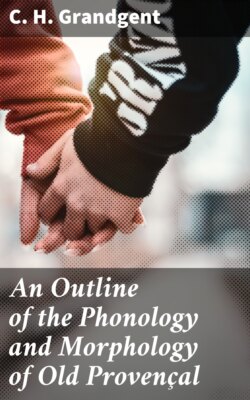Читать книгу An Outline of the Phonology and Morphology of Old Provençal - C. H. Grandgent - Страница 18
На сайте Литреса книга снята с продажи.
ọ
Оглавление33. Cl. L. ō, ŭ > V. L. ọ > Pr. ọ, which developed into ụ probably during the literary period: dolōrem > dolọr, spōnsa > espọsa, flōrem > flọr; bŭcca > bọca, gŭla > gọla.
1. An irregular ǫ, which is found in some words, goes back to Vulgar Latin: cǫbra = re-cŭperat, cǫsta (also ọ) = cōnstat, nǫra = nŭra, ǫu = ōvum, plǫia = plŭvia, redǫbla = ✱redŭplat, sǫbra = sŭperat, suefre = sŭffero. V. L. ✱cŏperat may be regarded as a fusion of cŭperat and ✱cŏperit (§ 40, 1; cf. Rom. XXXI, 9); ✱cŏstat is unexplained; ✱nŏra shows the influence of sŏror and sŏcĕra; the ŏ of ✱ŏvum has been explained as due to differentiation from the following v; ✱plŏia is to be connected with the popular plŏvĕre (cf. Meyer-Lübke, Einf., § 142); ✱sŏperat follows the analogy of ✱cŏperat; ✱sŏffero evidently follows ŏffero. Redǫbla (also ọ) is not accounted for. If trǫba has anything to do with tŭrbat, it was perhaps influenced by prŏbat (cf. Zs., XXVIII, 50). Engǫissa < V. L. ✱angŏstia = angŭstia. See A. Thomas, Nouveaux essais de philologie française, 1904, 339.
2. Some words have ü: iüs (also iọs) < deōrsum shows the influence of süs < sūrsum; lür (usually lọr) < illōrum (cf. lur in the dialects of Navarre and Aragon) comes through an ✱illūrum due to the analogy of illūi = illi; melhüra (ọ), peiüra (ọ) perhaps follow aüra < ✱a(u)gūrat; rancüra is a mixture of rancōrem and cūra; üis is from V. L. ūstium = ōstium (cf. Zs., XXV, 355); üpa < ŭpŭpa is due to onomatopœia.
3. The adverbs ar, ara, er, era, eras, meaning ‘now,’ are hardly to be connected with hōra. Meyer-Lübke takes era, etc., from a Latin ✱era corresponding to Greek άρα; ara, ar may come directly from άρα, άρ: cf. Gr., III, 552, note.
4. Tonleu, ‘tariff,’ from τελώνιον, shows double metathesis. For adoutz, ‘fount,’ see A. Thomas, Essais de philologie française, 1897, 205.
34. Before tš, dž (and it, id), before n´, and before final i, an ọ becomes ü in various dialects: cōgĭtat > cüia cüida, ✱stŭdiat > estüia, fŭgit > füg, refŭgium > refüg; jŭngĕre > iünher, ŭngĕre > ünher, pŭgnum > pünh; dŭī > düi, sŭm > sọ + i > süi. The ü before tš, dž apparently occurs everywhere except in Dauphiné; before n´ it is to be found in nearly all the dialects of the north and west; before final i it seems to be limited to Bordeaux, Auvergne, and a part of Languedoc.
